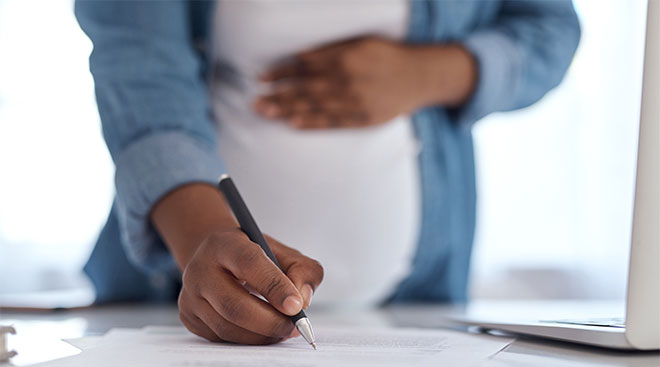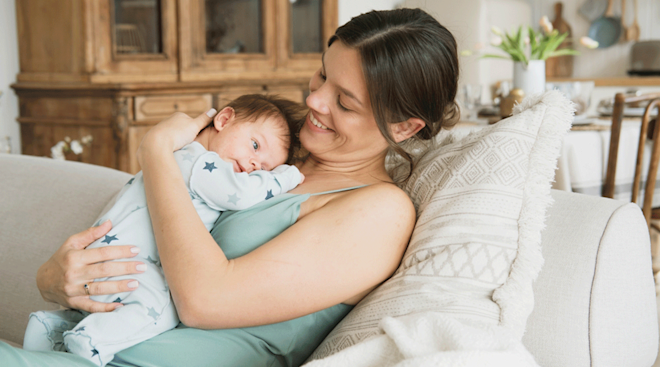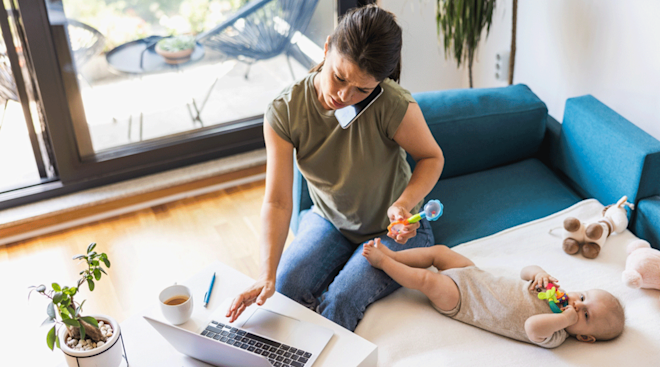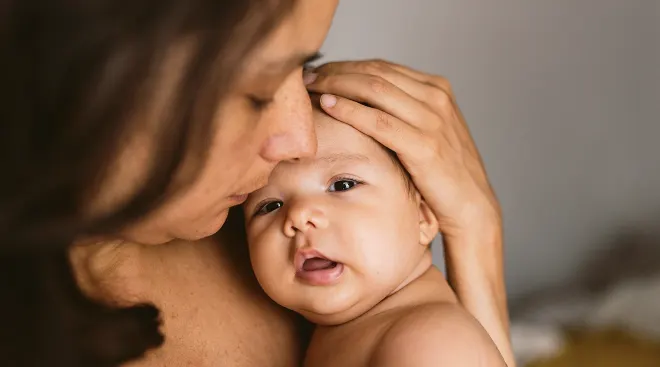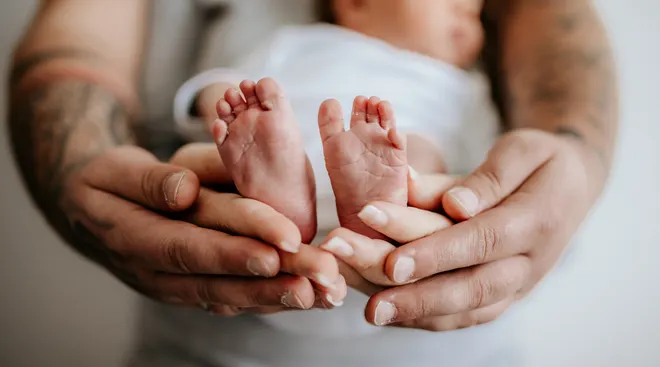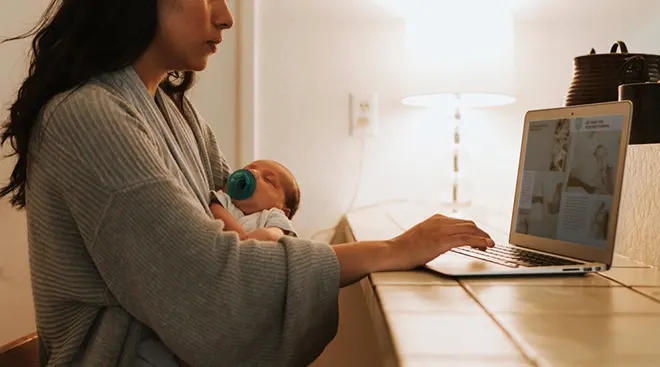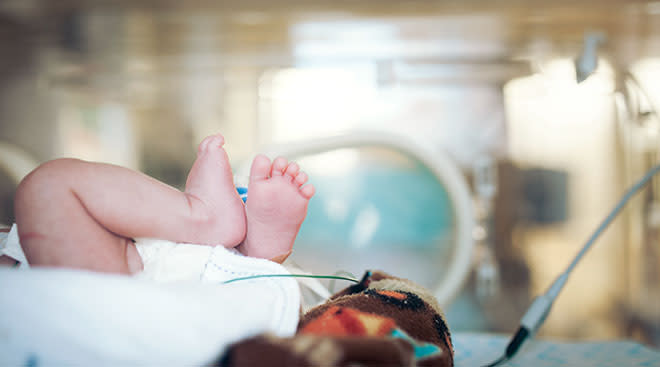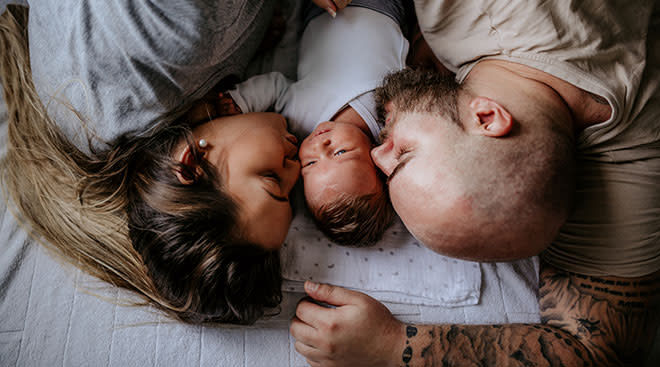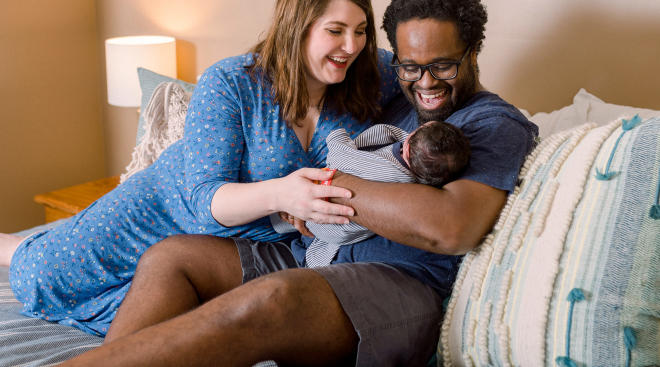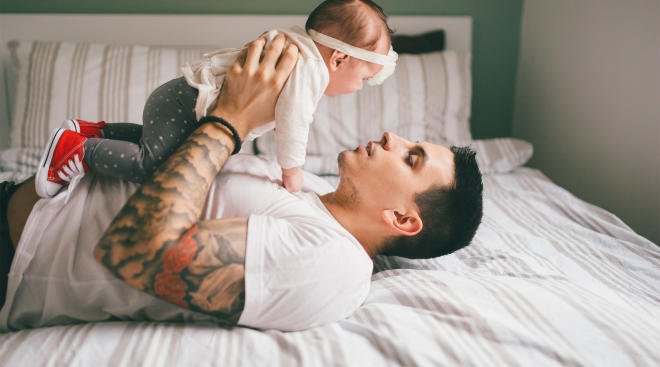Maternity Leave 101: What to Know Before Baby Arrives
There’s so much that goes into preparing for the arrival of baby. For working mothers-to-be, planning for maternity leave is just one more item on the to-do list. They have to work closely with their employers to iron out all of the details for leave, which can include everything from the day it starts to short-term disability benefits to protections under US federal policy and maternity leave law. Needless to say, there’s a lot to navigate. But it’s much easier to understand and digest when you break it down into smaller pieces. So how does maternity leave work and what steps should you take to prepare for it now? Deep breath—we’re sharing everything you need to know.
Every employer has its own definition of what maternity leave is, but generally speaking, it’s a leave of absence from work for the arrival of a new baby. Maternity leave works differently than standard paid time off (PTO), such as vacation or sick time; there’s usually a defined length of time and certain local and federal laws around it.
For a birthing parent, maternity leave is spent recovering from delivery and bonding with baby. Partners who take parental leave often use this time to care for the birthing parent during their recovery as well as to spend quality time with their newborn.
Employer-specific maternity leave policies vary, but many organizations within the US are required to provide protected leave to certain employees under the Family and Medical Leave Act (FMLA). You might hear someone say they’re “taking FMLA” when they’re going out on maternity leave, but not every person who goes out on maternity leave qualifies for FMLA benefits. What’s more, the FMLA doesn’t just apply to maternity leave.
“[The] FMLA provides eligible employees with up to 12 weeks of job-protected leave and benefits continuation,” explains Katie Brennan, SHRM-CP, a knowledge advisor for the Society for Human Resource Management. This protection applies to employees taking a leave of absence for a variety of reasons, including caring for a sick family member, according to the US Department of Labor. Maternity leave is also covered under the FMLA law.
When you take FMLA-protected leave, you’re guaranteed job protection and benefits for up to 12 weeks while you’re out. For the most part, when you return from FMLA-protected maternity leave, you’ll return to your original job. However, the US Department of Labor does state that, under the FMLA, employees are entitled to “their same or an equivalent job” when they return from leave. In order to be eligible for this protection, you must “work for an employer with 50 or more employees within a certain radius and have worked for that employer for at least 12 months and for at least 1,250 hours within the last year,” explains Vasu Reddy, senior policy counsel for Economic Justice at the National Partnership for Women & Families.
It’s important to note that you don’t have to take all 12 weeks of FMLA maternity leave at once. Reddy explains, “As long as you’re eligible to take leave under the FMLA, you can do so intermittently (in chunks of time) or all at once.” Parents can space these 12 weeks out across baby’s first year of life if they’d like—or even use some of it before baby arrives for doctor visits or if they’re put on rest, for example. Still, you only get 12 weeks total through the FMLA, so if you’re hoping to take as much time off as possible after baby is born, you’ll want to use it carefully.
The million-dollar question: Is maternity leave paid? Unfortunately, while FMLA maternity leave ensures that, as a qualified employee, you’ll have a job to return to and will continue to receive benefits, it doesn’t mean you’ll receive a paycheck while you’re out. As it stands now, maternity leave is unpaid at a federal level.
While paid maternity leave isn’t universally mandated, you may still have options. Some employers provide paid leave through company policies, PTO, short-term disability or a combination of these things. Some states also offer paid maternity leave to their residents.
Additionally, most federal civilian employees are eligible for 12 weeks of paid parental leave through the Federal Employee Paid Leave Act (FEPLA). It’s important to note that in order to be eligible for FEPLA benefits, you must also be eligible for FMLA benefits. (In other words, there are some prerequisites that must be met.) What’s more, before taking FEPLA, you must guarantee in writing that you’ll return to work for a minimum of 12 weeks after your leave has ended.
According to Military One Source, a program sourced by the Department of Defense, most active-duty birth moms are eligible for six weeks of paid convalescent maternity leave. They can usually piggyback this with an additional six weeks of paid Primary Caregiver Leave.
Employer-paid maternity leave
Every company offers its employees a variety of benefits and perks; these days, more and more employers are beginning to offer paid maternity leave. How much time they offer and at what pay rate depends on the individual company, so there’s no definitive rule on this. The only way to know for sure is to review your employee handbook and talk to your organization’s human resources department.
If your employer doesn’t have a formal paid maternity leave program, they may allow you to use your accrued PTO (in fact, some employers require this). Brennan explains, “employees have the option to use employer-provided leave concurrently with their FMLA absence.”
Short-term disability for maternity leave
Some companies offer short-term disability benefits, which can help you cover lost wages during your maternity leave (or in the event of a physical injury or illness). Sometimes this benefit is automatic at no cost to you, or it may be a program you have to opt into during open enrollment. If an employer doesn’t offer short-term disability benefits at all, it can be purchased independently. However, Brennan points out, “voluntary short-term disability plans often exclude pre-existing conditions,” so you’ll need to either enroll or purchase the plan prior to being pregnant in order for it to pay out for the birth of your child. (In other words, plan accordingly.)
Once you’ve given birth, the pay-out for short-term disability can be somewhat confusing. According to Reddy, short-term disability covers a portion of the birthing parent’s salary when they’re physically unable to work because of pregnancy. “For a typical uncomplicated pregnancy and birth, this would be four weeks before the due date, plus either six weeks after a vaginal delivery or eight weeks after a caesarean section delivery,” she explains. If there are complications, this period may be longer.
Paid maternity leave by state
Your state of residence may also offer paid maternity leave benefits, even if your employer doesn’t. According to the Bipartisan Policy Center, California, Massachusetts, New Jersey, New York, Rhode Island and Washington, as well as the District of Columbia (DC) offer some kind of paid family and maternity leave. Colorado, Connecticut and Oregon also plan to offer paid leave in the coming years. Each state’s plan is a little different:
- Rhode Island offers four weeks of paid maternity leave
- California and New Jersey offer six to eight weeks of paid maternity leave
- DC offers eight weeks of paid maternity leave
- New York offers 10 to 12 weeks of paid maternity leave
- Washington, Massachusetts, Connecticut, Oregon and Colorado offer (or plan to offer) 12 weeks of paid maternity leave
According to a 2015 study, the average maternity leave for a woman in the US is 10 weeks; however, there isn’t a set amount of time a new parent “should” take. If you’re basing the length of your maternity leave on FMLA protection, it would be 12 weeks. But since that alone is unpaid, not every new parent can take that much time. The minimum recovery time for an uncomplicated vaginal birth is generally considered to be six weeks, and it’s eight weeks for an uncomplicated c-section delivery. Many companies won’t allow their employees to return to work until their doctor signs off.
You’re also free to take more than 12 weeks of maternity leave, of course, if your company allows (or even pays) you to. But since maternity leave is unpaid under federal US law, unfortunately, this decision largely depends on what you can afford, rather than what you and your family need.
Since every pregnancy, labor and delivery is different, there’s no “official” maternity leave start date. Based on the FMLA, maternity leave can begin before baby is born, if an expecting parent chooses to use some of that time for prenatal appointments, severe morning sickness, bedrest or another complication. Similarly, short-term disability can start paying out before baby is born if you’re incapacited because of pregnancy and unable to work. Even with an uncomplicated pregnancy, you may choose to start your leave early if your company policy allows it. Just remember that this doesn’t guarantee FMLA protection or short-term disability pay-out.
For the average new parent, though, Brennan says that maternity leave typically begins when the employee is admitted to the hospital for childbirth, unless their health care provider requires that they take leave sooner due to complications related to pregnancy.
Paid federal employee maternity leave, through the FEPLA, only begins after baby is born.
If you’re an adoptive parent, you’re entitled to maternity leave, but it’ll look a bit different from that of a biological parent. For starters, short-term disability pay won’t be an option, since that’s meant for someone who is physically recovering for a prolonged period of time. Adoptive and foster parents are eligible for 12 weeks of job-protected leave under the FMLA and/or the FEPLA, though, and many private employers offer the same leave benefits to new parents, regardless of whether or not they gave birth to the child. Brennan says, “In my experience, voluntary maternity leave policies offered by employers typically cover adoption as well.”
A lot of language around maternity leave is focused on the birthing parent, but it’s just as important for partners to bond with baby. As far as short-term disability goes, partners aren’t eligible for this type of salary coverage since they’re not physically unable to work. On the employer-level, though, a lot of companies are beginning to offer some form of formal paternity leave for new parents—or they might offer a general parental leave that applies to either the birthing or non-birthing parent.
The good news for partners is that, no matter where they work, if they’re eligible for protection under the FMLA, they can use the benefit for parental leave. According to Reddy, “Under the FMLA, any parent is eligible for leave to care for their new child,” even if they’re not the birthing parent. Additionally, she notes that non-birthing parents can opt to use FMLA leave to care for the birthing parent as they recover from childbirth.
Brennan mentions that the same rules tend to apply to state-level benefits. There’s one caveat to FMLA-protected leave, though: “If eligible spouses work for the same employer, they’re limited to a combined total of 12 weeks of leave for baby bonding,” says Brennan. This is not true of the FEPLA; if both parents work for the federal government and are eligible for paid leave, they can each take 12 weeks.
Non-birthing military parents can take three weeks of paid Secondary Caregiver Leave, according to Military One Source
Navigating the ins and outs of maternity leave, short-term disability and the FMLA can be incredibly confusing. Doing your due diligence and some careful preparation ahead of time can make things a little easier once baby comes. That starts with letting the cat out of the bag. “Federal and state leave laws generally require that employees provide their employers with at least 30 days’ notice when their leave is foreseeable,” says Brennan. Suffice to say, the sooner you can let your employer know you’re expecting, the better—at least from an organizational perspective. Once you’ve shared the news, Reddy suggests requesting a copy of your company’s leave policies and sitting down with HR to find out what forms you can fill out prior to taking leave, including any FMLA, short-term disability and/or health benefits forms.
If you’ve purchased short-term disability outside of your employer, you’ll need to contact them directly to find out what you need to do ahead of time to ensure your payout goes smoothly. Also, if you live in a state that offers some kind of paid parental leave, look on your government’s website for instructions (your HR representative may be able to help guide you, depending on where the company is located).
Maternity and parental leave can seem really overwhelming, especially when you’re busy getting ready for the arrival of a new baby. But once you understand the different options and sort out which apply to your specific circumstances, the prep work becomes much more manageable. Your HR department should be well-versed in maternity leave policy and will be able to help make the process as smooth as possible for you—so that once your little one does arrive, you can focus on recovering and bonding with baby (instead of staring down a giant pile of paperwork).
About The experts:
Katie Brennan, SHRM-CP, is a knowledge advisor for the Society for Human Resource Management (SHRM) with more than a decade of experience in human resources. She received her bachelor’s degree in human resource development from the University of Florida.
Vasu Reddy, JD, serves as senior policy counsel for economic justice at the National Partnership for Women & Families. She received her bachelor’s degree from Harvard College and her juris doctor degree from Georgetown University Law Center.
Plus, more from The Bump:
Navigate forward to interact with the calendar and select a date. Press the question mark key to get the keyboard shortcuts for changing dates.
































